Q. Mold was found during my home sale, must I address the mold?
Selling a new home or a used home, know that mold is not a Selling Feature. If you have mold, you had or have a water issue and mold is the byproduct. Generally speaking, most people put addressing mold at the top of their To Do List when buying a home. We would recommend you negotiate with the buyer if they have a substantial list of repairs they want. But be aware if your sale falls through, you now know you have mold and must discloe this to future buyers. It is a smart move to try and address the mold as it is more concerning than say an old water heater.
Q. What is Mold?
Mold is a fungi that can be found both indoors and outdoors. Mold is natural to our environment; some levels of Mold are present at all times (everywhere).
Outdoor Molds can be found in shady, damp areas such as where leaves lay or where vegetation is decomposing. If mold was not outside, our mulch, leaves and grass clippings would never decompose. So mold is everywhere for good reason, outside.
Indoor Mold is found when moisture levels rise above 60; for example, Attics, Crawlspaces, Basements and Showers (bathrooms). Vacant homes can also create environments where mold will grow. In short, mold will grow at temperatures and moisture levels that humans would consider inhospitable. Mold will grow in a damp cool crawlspace, but not in your bedroom which is dry and has temperature in the 70 degree rage (plus or minus).
The photo below? Water splashes on the wall from a washing machine discharge and allowed mold to grow, yep I can't make this stuff up.
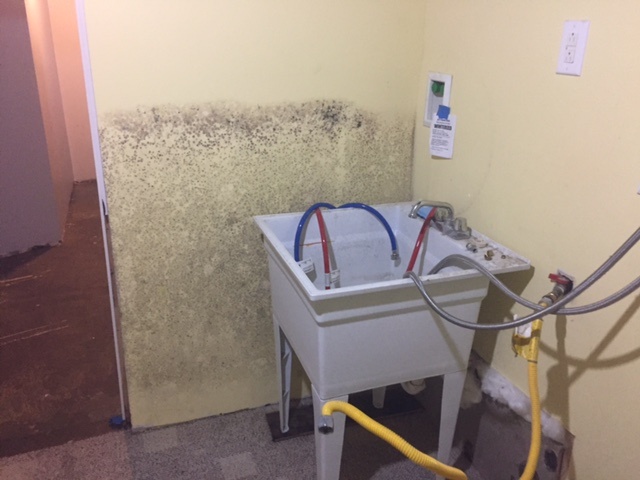
Q. Is a 100% mold free space possible?
No, mold is ubiquitous. We have tested homes, offices, restaurants, schools, medical facilities and yes we always find some airborne mold, it's never zero.
That said, an area of visible mold growth the size of you hand can be millions of spores, so it is generally understood that when we say mold is everywhere we mean you can expect to have invisible air-borne mold present anywhere you go, both inside and out.
So when you see mold that means something went wrong to allow mold to grow in a built environment. If you checked into a hotel room and saw mold, would you want another room?
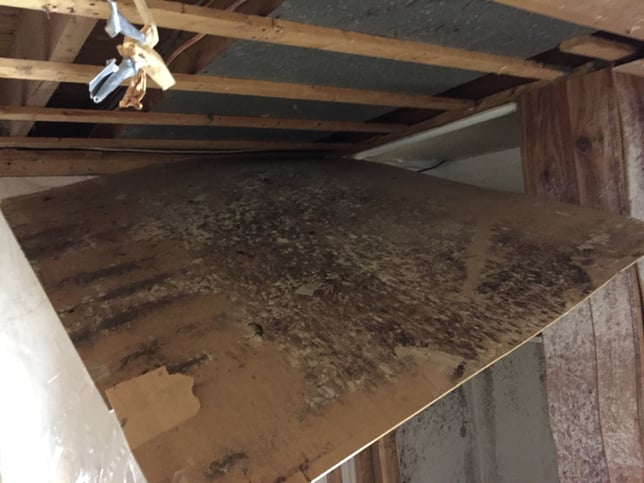
Initial Consultation
888-301-1050
Q. How many types of Mold are there?
There is no general consensus as to how many types of Molds there are in the world. Estimates range from tens of thousands to over three hundred thousand or more. Depending on where you live you would only be exposed to a very small percentage of mold.
Q. Should I be concerned about Black Mold?
Black mold is a color of mold not a type.
Whenever someone says black mold, such as a lay person they are simple saying they don't know much about mold, which is fine.
If someone who is in the mold industry perhaps a company trying to sell you a service uses the word black mold, well they are trying to scare you, to elicit a reaction so you spend money.
Pro Tip
The term black mold has been used improperly for decades. Green, white, grey or black they are all colors not types of mold. If you have mold it should be addressed.
Look if your mechanic says you need a new "flux capacitor", you need a new mechanic, if a mold company says you have black mold, you need to find a new reputable company.
Q. I see Mold but I don’t smell a musty odor, why?
If I don’t smell Mold is it not Mold?
When mold is growing it off-gasses, as it is consuming organic matter and breaking it down, this causes the odor of mold. Think burping and farting as mold is consuming so off gassing is natural when mold is actively growing. So if you see mold but do not smell musty odors, the mold is likely dormant.
Mold can hide behind walls where moisture is present, when moisture is not present it won't grow and
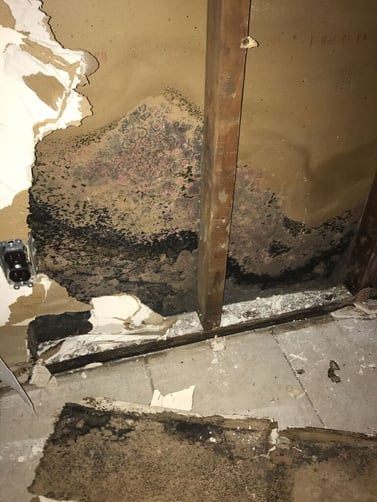
hence no off-gassing or odor. Remember molds grow best in warm, damp (wet), and humid conditions. When conditions are right (humidity below 55 and temperature below 70 degrees). When you have temperate ranges outside this sweet spot, molds will go dormant, like a lawn in winter. When temperatures rise and moisture levels increase molds will grow again, which is when you are more likely to smell the musty odor.
Q. I smell a musty odor but don’t see any Mold?
If a musty odor is present, which is not typical for the living space, quite simply you have something that is off-gassing causing the odor which is mold hiding behind something out of view. Maybe, that musty odor is not mold, so you must ask yourself a few questions.
- Has anything changed in the space?
- Has anything new been brought into the space such as books, boxes or old possessions that maybe giving off an odor.
- New carpet, paint, furniture?
In short if you want to rule out mold being present, you have to find another cause. You see where this is going, if nothing has been added then something that is and has been present is off-gassing and if the odor is truly musty, then a moisture issue is present and fueling Mold growth. In the industry we call this Hidden Mold and you should hire a professional to look for Mold
Q. What are some ways I can recognize mold?
Mold has a musty smell. Frequently mold grows in basements, attics, under carpets, in closets or crawlspaces, and behind walls. Often it leaves visible stains on walls, ceilings and furniture. Mold can be visible detected by discoloration on surfaces, white, black, brown, green, tan, purple are all discolorations that can represent mold growth.
As a general rule, visually mold represents itself as discoloration of a surface.
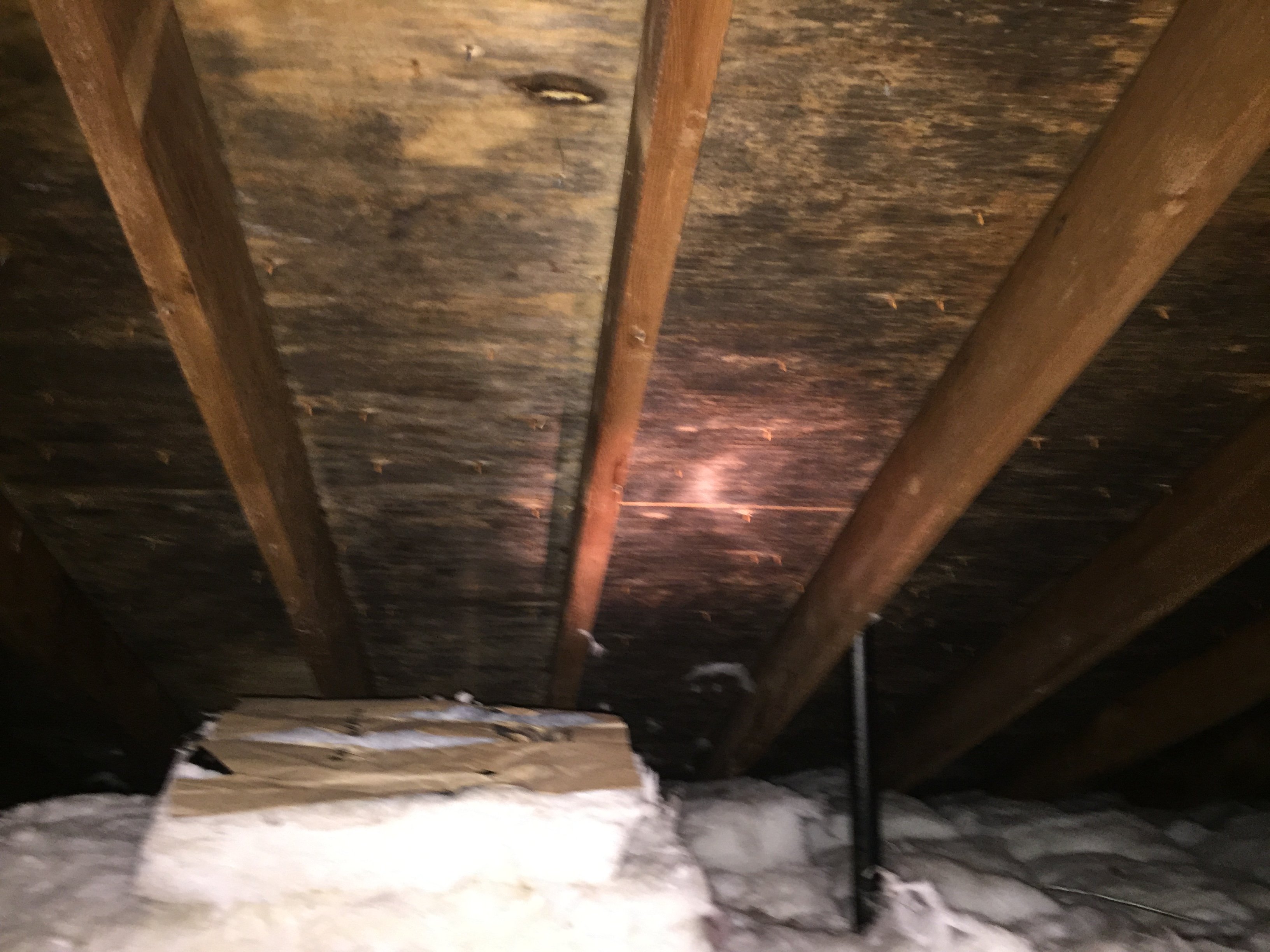
Q. I found Mold growing in my home, how do I test the Mold?
The EPA and CDC do not recommend sampling (mold testing) for Molds, when obvious mold growth is present. Since the susceptibility of individuals can vary greatly, the type is not important. If you are susceptible to Mold and if it is seen or smelled, there is a potential health risk; therefore, no matter what type of Mold is present, you should arrange for its removal.
While the EPA doesn't recommend testing mold, they do recommend remediating mold.
Q. I saw Mold and hired a company to inspect and they confirmed it was Mold.
They were quick to give me a cost to remediate (read expensive Mold remediation) but said little regarding why the Mold was present.
Mold inspection without evaluation as to what caused the Mold is a concern. Mold inspections should provide an opinion as to why the Mold was present, i.e., what caused it and what to do to prevent growth in the future. We have seen Mold grow back after remediation due to the fact that the moisture problem was not addressed – controls to stop the moisture were not established so of course Mold can grow back.
I would not recommend hiring anyone to remediate mold if they cannot point to the causes of the mold.
Q. Is mold damage covered by homeowner’s insurance?
Every policy is different, some policies cover mold others do not. You would need to review your own policy to know if mold damage is covered or contact your insurance agent.
Q. Will painting over mold solve the problem?
No, you cannot paint over mold to solve your problem. If you don't fix the source of the mold, painting and cleaning won't stop mold from growing back.
The mold can grow again on the painted surface and mold spores which can be invisible to the naked eye can still be present away from the area where viable growth is present.
There are actually many types of mold that like to feed on paint, also paint is attached to an organic surface (Sheetrock paper) which mold likes. Paint also has organic content, organic = mold food source.
Q. What are common symptoms a person might experience with mold exposure?
Symptoms of mold exposure are similar to respiratory allergies. Flu like symptoms can occur including itchy eyes, runny nose, cough, congestion, and headaches.
Autoimmune response is a common mold exposure reaction.
Q. How much mold exposure is harmful?
There are no government standards on acceptable mold exposure level. Called PEL (Permissible Exposure Limits) there are many compounds which the governments says we can be exposed to, mold is not one of them. Individuals differ on the amount of mold exposure they can tolerate. The elderly, young children and those with compromised immune systems are usually more susceptible to the effects of molds than others. Just as some people are allergic to one cat and some people have multiple cats without any allergic reactions. Everyone is unique.
Q. Can you suffer brain damage from mold exposure?
Mold exposure has been linked to serious, long-term effects like memory loss, insomnia, anxiety, depression, trouble concentrating, and confusion.
Q What level of mold in the air is acceptable?
No regulatory agencies have established a specific number that defines safe mold exposure. Mold counts can vary based on the time of year, and the outdoor environment. /how-to-interpret-mold-test-results
You can perform air sampling to evaluate indoor spore counts. Typically you obtain multiple indoor samples and an exterior sample to act as a background or baseline sample. You can also sample a non compliant room in the structure to establish a baseline indoors. Generally speaking more samples are better than less if you are trying to define if a problem does or does not exist.
Understand you will always find mold in the air. A room with plants, firewood and old books or all three of these items will have a higher spore count than a room that doesn't have these items. So you would expect air sampling in this type of room to have higher levels.
Q. How many samples are required in order to verify a mold problem?
The number and type of samples taken depends on each situation. For air testing, typically one or more tests are taken indoors per complaint room(s) and even a non complaint room (indoor background) and another outdoors, for comparison purposes. Multiple samples can be taken when a stronger conclusion is desired. More testing is better than less. When visible mold is obvious, sampling is not always necessary, unless you have a specific purpose to test known growth.
You can also test for mold in a real estate transaction if buyer and seller are in disagreement regarding mold being present.
Q. Do you recommend a mold testing kit I can buy at a hardware store?
There are advantages to having a mold professional take samples as opposed to a using DIY kit. A professional will know where and when to take the sample, and how to interpret the results. They also have the right tools for the sampling. A DIY kit typically is a dish used to capture spores; this is not the most effective method.
Q. Do you recommend mold inspections when buying a home?
Home inspectors do not inspect for mold in a normal home inspection, if they see staining that is mold like they will call it out. I can say from experience we have found mold after a home inspection was performed, simple because we were looking for it and they wee not.
Most mold inspections average between $300 and $500 with a credit supplied if remediation is needed and performed. Remediation's on the low end can cost $850 and can cost over $20,0000 for large projects, so the cost of an inspection pays for itself.
Bottom line if you get a mold inspection you being covered for mold and most every inspection is going to give you an education regarding what you can do to prevent future growth and improve indoor air quality.
Q. Why is mold a concern?
Mold is not a selling feature of a home. Mold indoors is viewed as air pollution. This is because a mold spore can be an irritant to an individual susceptible to the spore. Meaning if you are allergic to mold you will have a reaction. Mold is potentially hazardous to your health. It causes a number of health concerns, including allergic reactions and respiratory problems. Persons especially susceptible to irritations from mold include the elderly, newborns, those with asthma, or a compromised immune system. Additionally, mold breaks down organic material which off gases mycotoxins and MVOC's. These compounds are known to cause health problems. So you see it is not just a mold spore that can be an irritant, but also compounds created by mold consuming material and the breakdown of the organic materials.
Q. Is there such a thing as toxic mold?
There is no mold called toxic mold. Toxic mold does not exist. According to the CDC, there are some molds which produce toxins (mycotoxins). However, the molds themselves are not toxic (poisonous). So no there is no toxic mold.
Q. Where might you find mold?
Mold spores are present in normal outdoor and indoor air. Mold can grow on paper, wood, carpet, insulation and dust that gather in moist areas.
Q. What are common areas where mold grows?
You will find mold outside in compost, on leaves, in mulch, on firewood and in the grass. Mold is an important component of the outdoor ecosystem.
Q. Where is mold commonly found in a house?
It often grows in attics, basements, and crawlspaces. In short if you do not heat or cool a room (conditioned) then mold can grow.
Q. I heard if I am buying a home that was flipped I should do mold testing, even if everything looks new?
100% test flipped homes for mold. We advocate testing when buying a flipped home, since we have found homes with mold that was covered over. In short mold is typically not in the budget for flippers. This is particularly apparent when you have a finished basement. You don't even want to know how many flipped remodeled basements we had to undo. The photos below is a basement that was remodeled (flipped). New owner noted musty odors in the space, this was mixed with the odors of new carpet and paint. Curren found a crack in the foundation and mold behind the walls during the remediation.
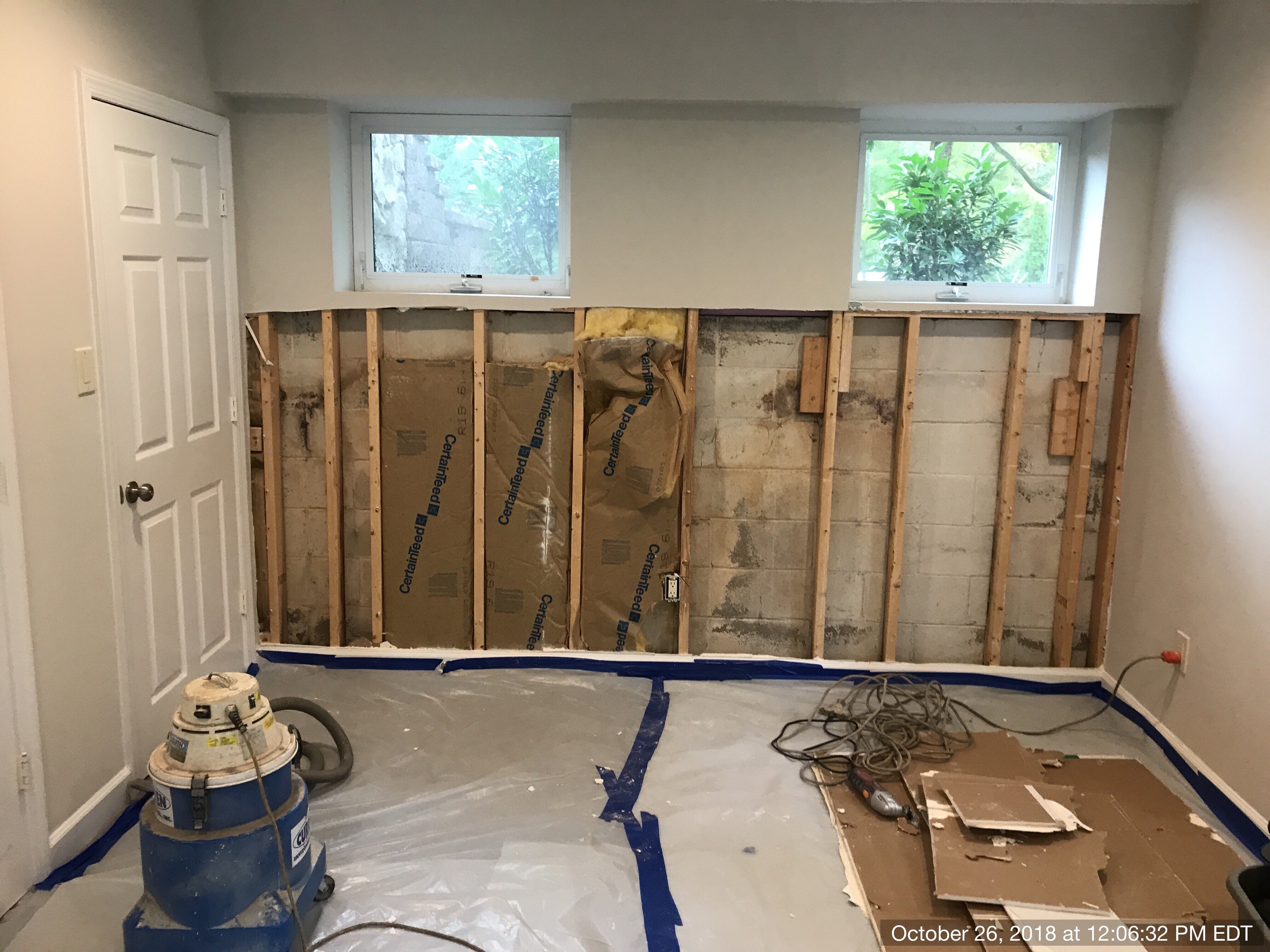
Q. Why is mold growing in my attic, basement and crawl space?
Mold likes to grow in unconditioned spaces such as attics, crawl spaces and attics. Unconditioned means not heated or cooled. These unconditioned spaces are subject to condensation throughout the year which allows mold to grow. lets agree if your basement is finished and also heated and cooled, the temperature is never the same as it is on other high floors in the house. Subterranean spaces are near optimal environments for mold growth. Ask an expert, all questions will receive a response.
Q. I am buying a home that has white paint on the ceiling in the crawlspace. I was told mold remediation was completed, am I good?
Maybe. Paint and a fungistatic coating are not the same thing. Fungistatic coatings, which is what the industry uses has properties that prevent mold growth. The better coatings have 10 year warranty. Normal paint is not fungistatic and paint has a number of organic compounds that mold can and will grow on. If you see a coated surface, ask for the paperwork. We have remediated a number of crawlspaces and attics where the wood was white, mold was said to be remediated, yet mold was found growing on the surface. Clearly the white coating was not fungistatic.
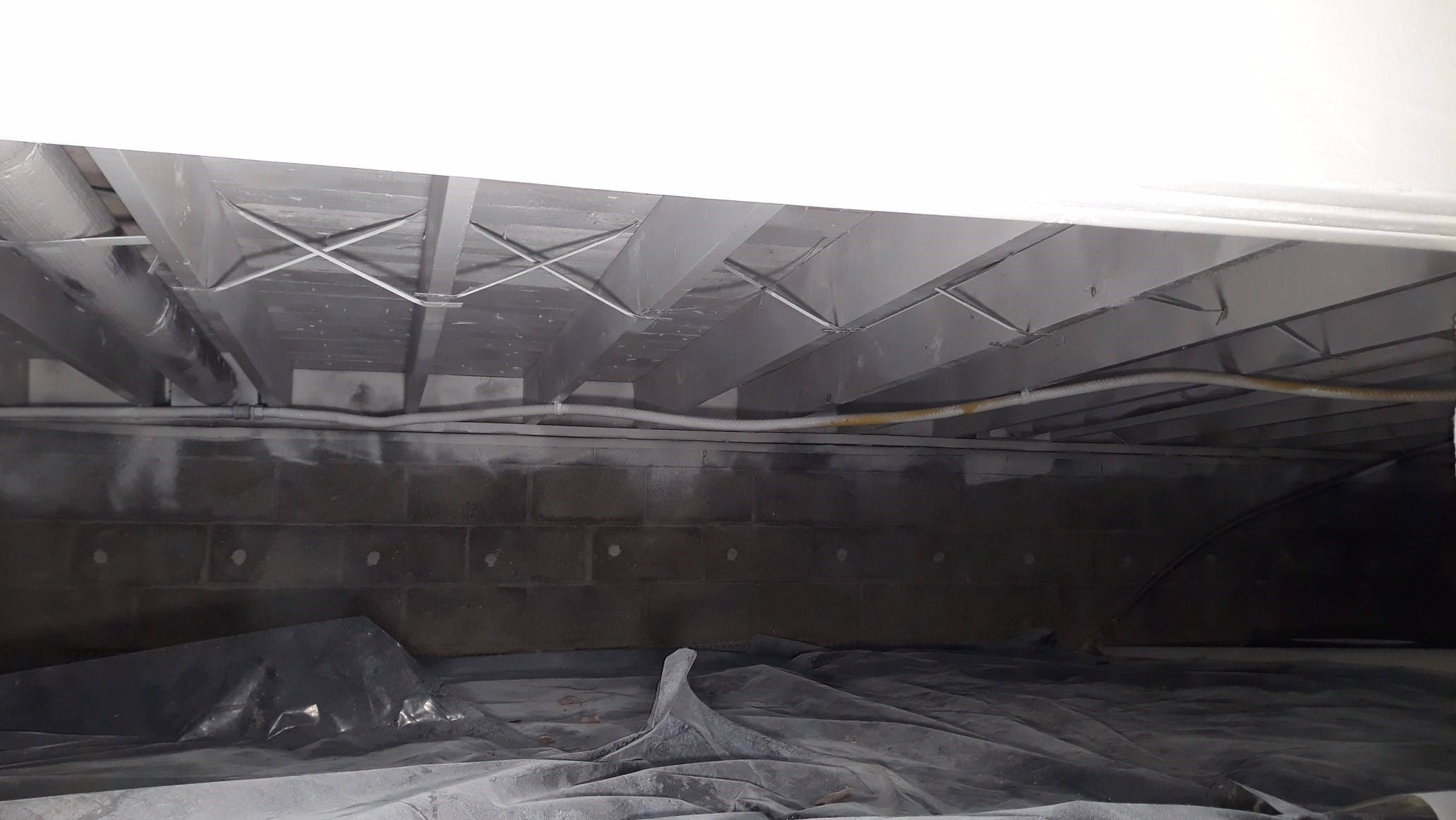
Q. How is mold removal performed? (Mold Remediation)
Mold removal in New Jersey, Delaware & Pennsylvania, is also known as mold remediation, it is based on eliminating mold and its spores from your property. Mold remediation is not killing the mold, as dead mold spores are still be irritants. Mold removal protocol varies for each particular situation but is based on a basic foundation of the following:
- Isolation of working area (mold containment).
- Control airborne spores that will be disturbed during remediation.
- HEPA vacuuming of mold impacted surfaces.
- Cleaning and transporting of contents (removal of mold contaminated media).
- Spraying & scrubbing of unmovable structure elements.
- Disinfecting, deodorizing & encapsulating surfaces, and rebuilding.-Mold Remediation.
- Post remediation air scrubbing (cleaning of the space post remediation to remove residual spores.
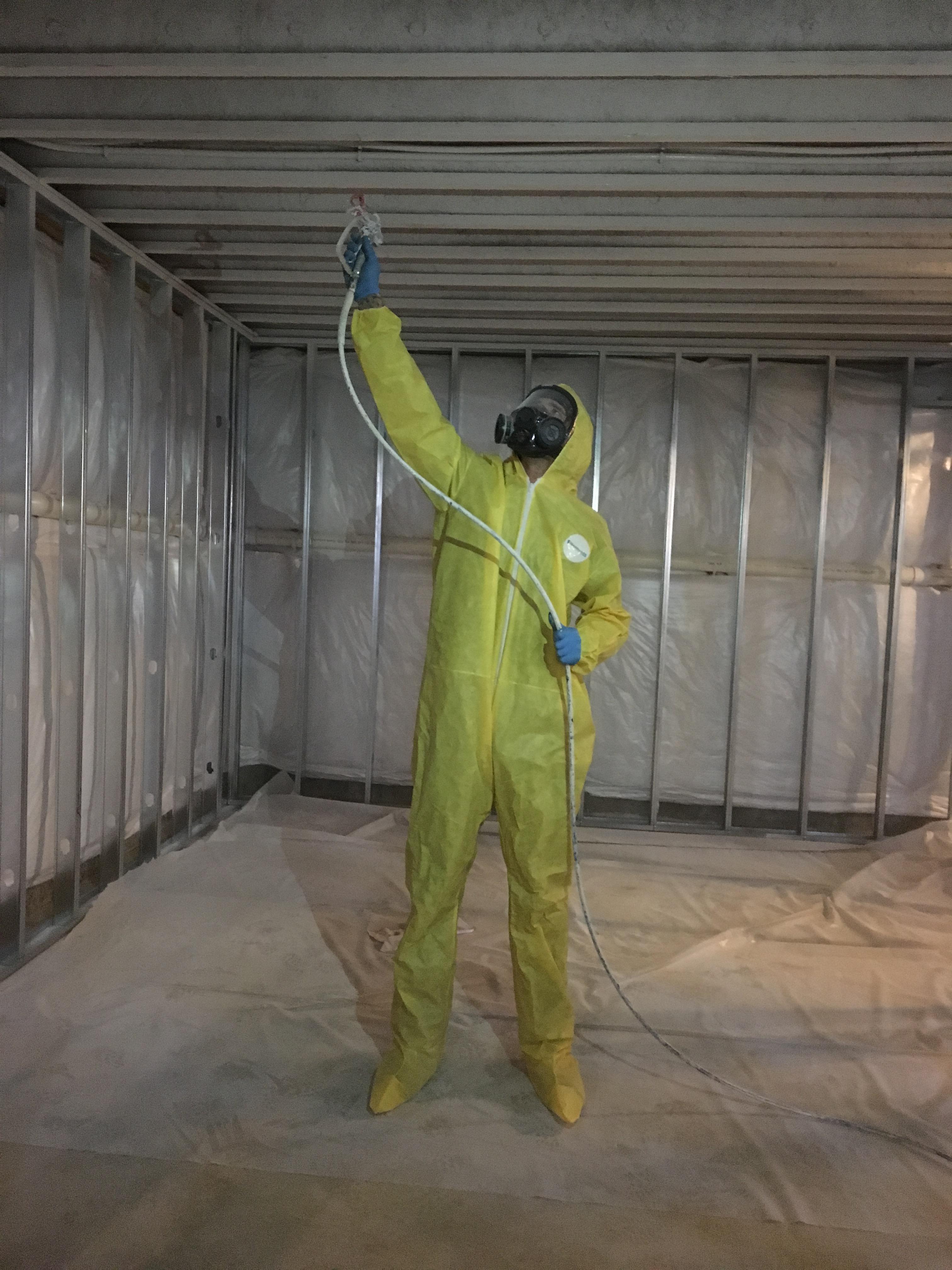
Q. Why do you have mold?
If you have moisture, oxygen, correct temperatures and an organic food source, mold will grow.
Q. What are the ideal conditions for mold growth?
Temperatures between 68º F and 86º F; a humidity level of 60% or higher; and water damage not addressed within 48 hours.
Q. Does a musty odor mean I have mold?
A musty odor is the "off-gassing" of mold. It typically indicates the presence of mold that is growing. Dormant mold (think winter time) will not off gas and the musty odor will not be present.
Q. I got a mold remediation estimate and it said they would wipe surfaces with a fungicide. This is a basement with exposed wood beams that are rough, I can't believe you can wipe the wood effectively or without getting splinters. Will they actually wipe the mold away?
No you can't wipe rough unfinished wood effectively. You would HEPA vacuum the wood to remove the mold, just like you would vacuum a dirty carpet. When I see that companies say they will wipe wood beams, I know they don't know what they are talking about if if they are saying this what else are they doing wrong.
Q. How do I know if a house I am buying has mold?
The best way to be sure if a house has mold is to have it inspected by a professional. Often there are signs of water damage or a musty odor. These are indications you may have mold. An environmental mold professional will inspect the property using sophisticated equipment to confirm the presence of mold.
Many home inspectors have both experience and training with mold, so a mold inspection or test maybe able to be performed during a home inspection.
Ask an expert, all questions will receive a response.
888-301-1050
Q. How do Molds affect people?
In 2004 the Institute of Medicine (IOM) found evidence to link indoor exposure to Mold with upper respiratory tract symptoms, cough, and wheeze in otherwise healthy people; with asthma symptoms in people with asthma; and with hypersensitivity pneumonia in individuals susceptible to that immune-mediated condition. The IOM also found limited or suggestive evidence linking indoor Mold exposure and respiratory illness in otherwise healthy children.
In 2009, the World Health Organization issued additional guidance, the WHO Guidelines for Indoor Air Quality: Dampness and Mold [PDF - 2.52 MB]. Studies have suggested a potential link of early Mold exposure in children to development of asthma in, particularly among children who may be genetically susceptible to asthma development, and that selected interventions that improve housing conditions can reduce morbidity from asthma and respiratory allergies. Bottom line more research is needed, but evidence to date correlates to health related concern in Moldy environmental as compared to living spaces that lack Mold growth.
Q. Are newer homes more susceptible to mold growth?
Mold is more likely to be found in newer, more tightly sealed buildings, where there is less air circulation. These tighter homes (think Tyvek wrapped, well insulated, newer windows) trap more moisture, fueling mold growth.
Due to more air tight building, moisture buildup can occur and you can find mold in the HVAC system as this photo of a HVAC air register shows.
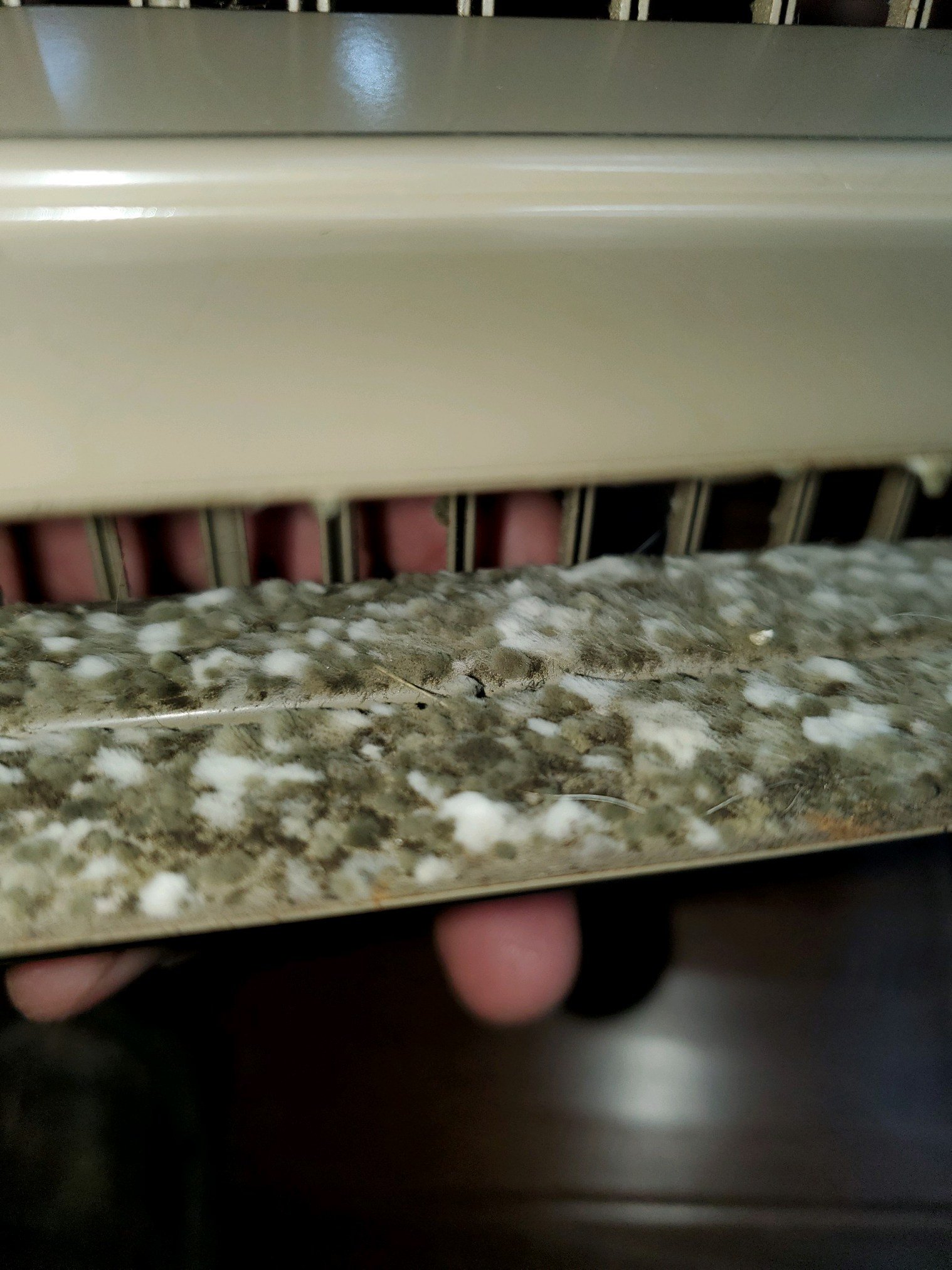
Q. Can I find the mold and just fix the problem myself?
Most likely not, we have come in after a DIY mold project and it almost always comes up short.
Q. Is there a secret sauce, spray or powder that I can use to remove mold?
No, mold remediation is labor intensive, even when we try and explain how someone can DIY mold, they fail. You need s[special equipment and material that you don't find at your local home improvement store.
Remediation is the removal of the mold which takes work and training.
A mold remediation professional is trained to contain the mold during removal (so you do not spread the mold), the mold is removed (mold remediation means mold removal) and to treat the area with antimicrobial to kill any remnant spores and prevent future growth. Professionals use portable air scrubbers, HEPA filters, HEPA vacuums and apply fungistatic coatings as part of the mold remediation process. Mold remediation is a multi step process. DIY mold remediators do not have access to this equipment or the training.
We are often called to remediate a mold problem at a property after the owner has tried to cleanup the mold, but the mold keeps coming back. This is because the mold was never fully remediated. Mold was left on surfaces, The vacuum or cleaning instruments they used spread the spores into the air and when they landed on organic material, they grew again.
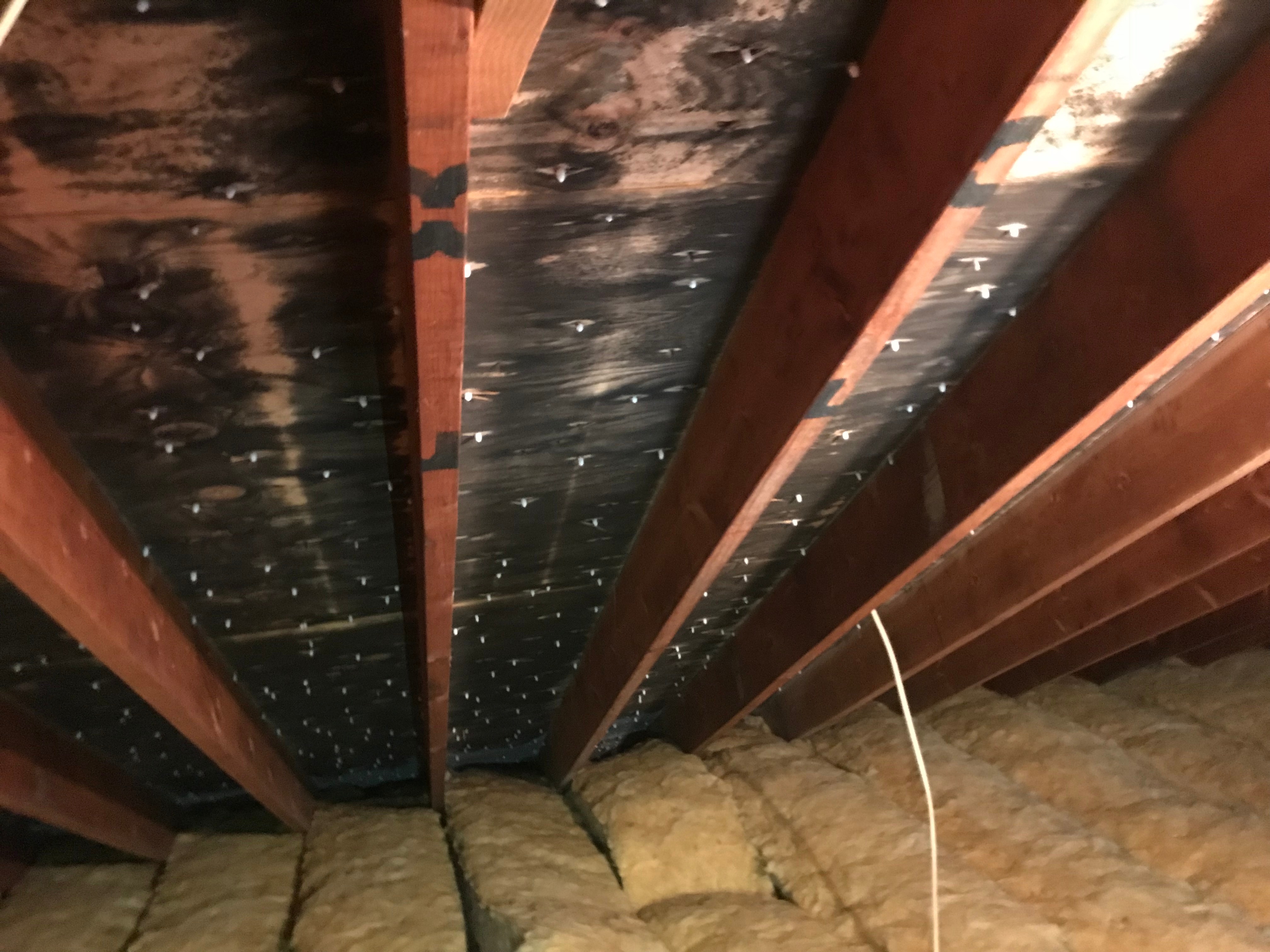
Mold removal is a complex process and is best left to experienced, trained professionals. An inexperienced and untrained individual trying to perform mold remediation or having a general contractor attempt mold removal is usually unsuccessful and can spread the problem. We have found more often than not, improperly trained contractors who attempt remediation end up spreading the contaminants airborne, creating an even larger problem. We also find that the mold will come back from work performed by inexperienced individuals.
DIY Mold homeowners often become sick due to not following proper mold removal procedures. For example, proper Personal Protective Equipment (PPE) must be worn and the proper containment procedures must be followed to prevent the contamination from spreading to unaffected areas of your home. Without taking these necessary precautions a mold remediation project often becomes a worse.
Our top priority is to keep you and your family safe both during and after the mold remediation process. Our clients can be assured that Curren Environmental Inc. will take all necessary precautions to ensure your safety.
Q. Can I use bleach to clean the mold?
The EPA does not recommend using bleach to kill mold. Bleach is mostly water; once you stop smelling the bleach it stopped working. Using bleach to kill mold results in dead spores left behind which can still irritate people. Bleach doesn't get the airborne spores (mold in the air is the likely source of how mold started in the first place). These spores eventually land on organic material and grow.
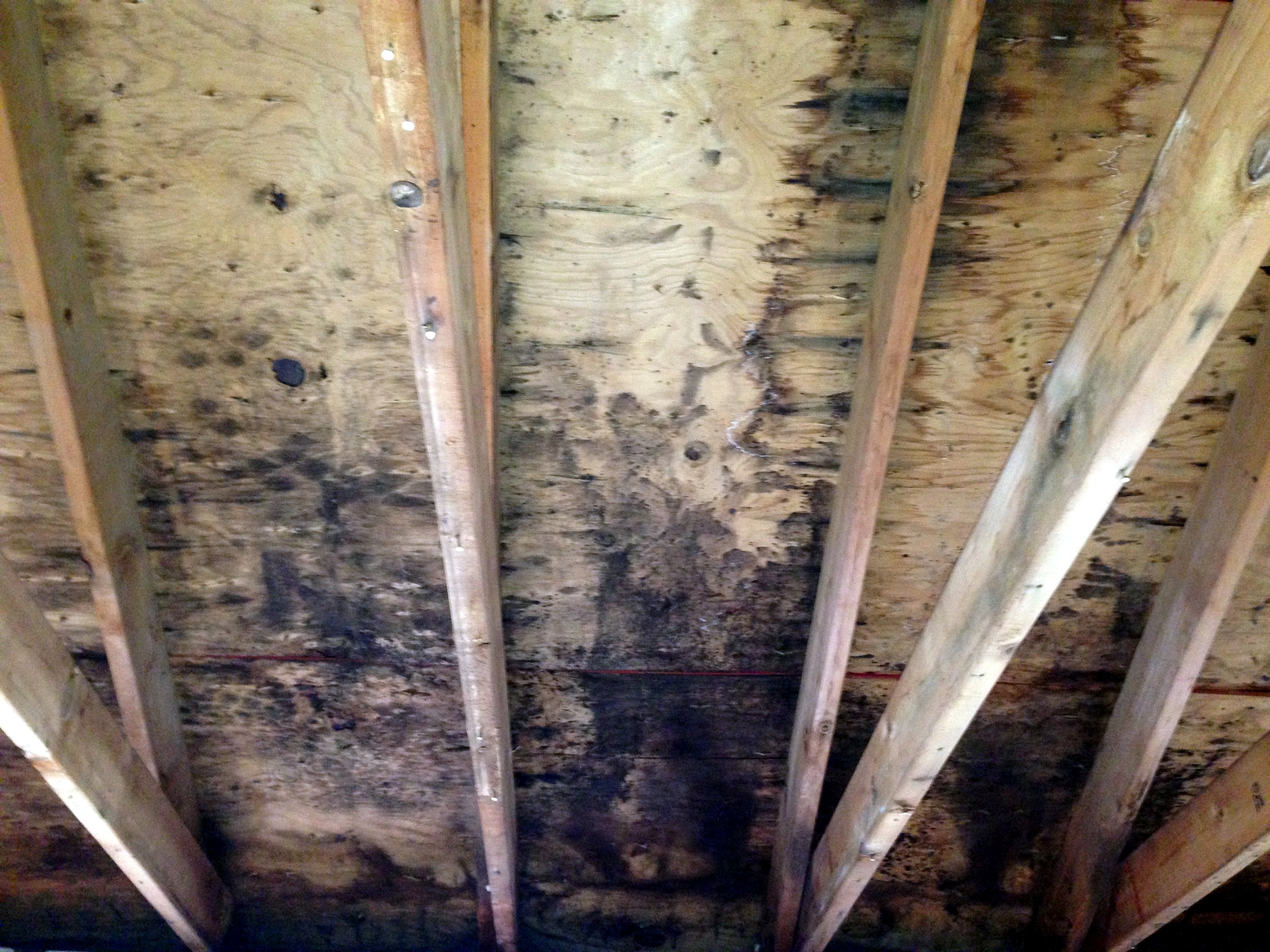
Q. How do I know if what I have is mildew or mold?
Mold and mildew are both types of fungi. Mold is fuzzy and black, green, or blue in color. Mildew is powdery, and gray or white in color. When mildew is left to grow for a period of time, it can turn into mold.
Q. My home inspector found mold, now what?
Once you have discovered mold, you need to locate the moisture problem and correct it promptly. Call a professional who will carefully contain the area, remove the mold, and treat the area to prevent further mold growth. In some instances they may need to check for possible structural damage.
Do not remediate mold until the cause of the mold is determined. Many times it is more than one source. Also water leaks DO NOT GO AWAY ON THEIR OWN.
Q. How do you check for mold?
There are different ways to detect the presence of mold, including a visual inspection, air sampling, surface sampling, bulk testing, moisture evaluation, and borescope. There are many different types of mold. Laboratory testing can identify the species of mold present in your home.
Q. Can you test behind a wall for mold?
You can test behind a wall by physically cut out a section of the wall or by air sampling inside the wall and the below photo is showing:
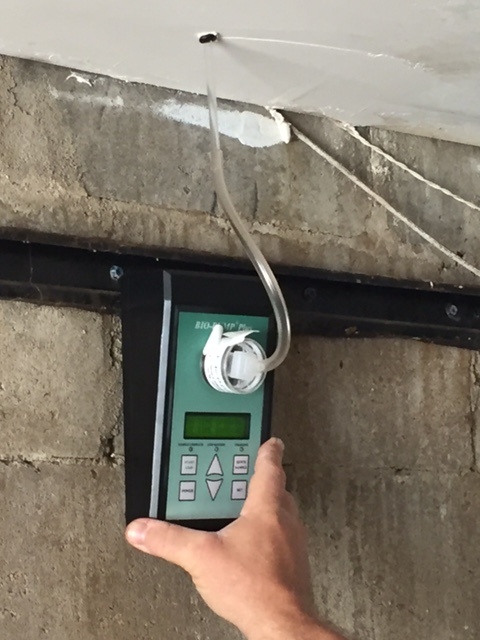
Q. Should I have the mold tested to find out what type it is?
Mold can be sampled and tested but is not necessary. The EPA
advises not to test; there are no federal regulations for mold in a residential
setting. The focus is removal of the mold and fixing the moisture problem.
Q. What is a HEPA filter?
HEPA stands for high-efficiency particulate air. Use of a HEPA vacuum when removing mold will get rid of any spores that may be present.
Q. How do I know if the mold I have is the type that makes people sick?
Different types of mold affect people differently. It is an allergen and may cause respiratory issues for some people. Mold growth indoors is considered indoor air pollution..
Q. After remediation of mold, will the mold return?
To prevent mold from coming back, follow these guidelines:
- Stop water infiltration into the structure
- Use a dehumidifier in damp areas such as basements and
crawlspaces
- Use exhaust fans in kitchens & bathrooms
- Fix water damage immediately.
Q. Is a mold-free home possible?
No, mold is part of our environment. However, there should be a lower mold count indoors than outside. You want to prevent your home from being conducive to mold growth.
Many people suspect mold in their home either from smells (musty odors) or health concerns, or from prior water issues. The infrared photo below shows moisture behind a wall from the leaking window above the wall. We able to pull the wall paper off the wall (with owners consent) after we showed them the image from the infrared camera. The window was leaking when rain hit it from a certain direction. The water ran down the wall causing mold, making the owner sick and giving off aperiodic musty smell. Owner never saw water and there is a dirt crawlspace below the window where the water ran to.
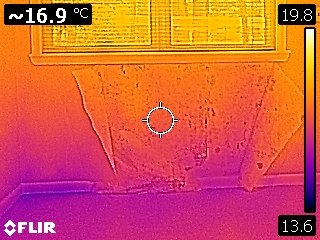
Q. Why are there price disparities between mold remediation companies?
The scope of the work to be performed by mold remediation companies can vary which may result in price differences. Certain firms are more thorough than others. It is best to get a second quotes for mold removal work to understand any price disparity.
Another reason is many people do things they are not good at, since there are no mold regulations in New Jersey, Delaware or Pennsylvania, any Tom, Dick or Karen can do mold work, and they do, just not very well.
Pro Tip
It's a safe bet not to hire a company working out of a home, as physical labor is needed to remediate mold and people working out of a house, don't have employees, warehouses for equipment or even parking for company trucks.
Everybody wants to hire an expert, an experienced firm. Experience is built over time, check the age of a firms web page, newer dates say newer firms = less experience.
Q. Are mold levels regulated by the law?
There are no federal laws or standards regulating types or levels of mold found in a residential setting. Mold testing and remediation follows industry guidelines to remediate and test mold.
Q. Can Mold be killed by cold weather?
Mold spores can survive extreme environmental conditions, such as dry and freezing conditions. Like grass they go dormant and will become active again when conditions improve. In cold weather, mold will not grow and will remain dormant until temperatures increase.
Q. I am looking to hire a firm to remediate Mold, what licensing should I look for?
If your site is in New Jersey, Pennsylvania or Delaware, there is no licensing or state certification. Unlike tank removal which requires companies to be certified, Mold remediation is not a service where a license is required.
Q. Should I be concerned that the Mold Company is not certified?
Yes and no. Yes, you should be concerned as it is difficult to ascertain if the company is qualified or competent to remediate Mold when a licensing program does not exist. There are things to look for when evaluating Mold fits. One did you find them through advertising? Surveys have shown that referral is a more solid form of evaluation as opposed to pay per click advertising.
Next, google the company, is it a PO Box, do they work out of a house in a residential area, if so tread with caution, these firms need personnel and equipment to perform the work and a home based business typically means they subcontract the services. Third, do they provide any other environmental services? Carpet cleaning and termite services are not what is typically associated with environmental services, these firms maybe doing Mold as a sideline. Full-service companies would also perform other remediation services such as tank removal, soil and water remediation and environmental audits. These types of firms have no doubt encountered Mold in a variety of commercial and residential settings and are more likely to have the expertise. As a general point of reference New Jersey, Pennsylvania & Delaware require licensing to perform these tasks so you can be assured there are some core competencies at the firm.
Everybody want to hire an expert, an experienced firm. Experience is built over time, check the age of a firms web page, newer dates say newer firms = less experience. The link below lets you check a domains age:
Q. Why should you not be concerned about Mold licensing?
Well to be fair less than a dozen states have mold regulations, as an example New York State has licensing requirement for Mold inspection and remediation and that started on January 1, 2016. So it is hard to be licensed in a state if the state does not offer it. I would circle back to the above answer for a more thorough explanation as to why you should be concerned.
Q. Can I trust a mold company that works out of a home?
Mold remediation requires specialized equipment and can be physically demanding. Mold crews are deployed to remediate a site. These people who dabble in mold that work out of a home cannot have an in house staff to perform the work. If you don't have personnel in-house to remediate mold how can you ensure the quality of the work?
.jpg?width=4032&name=IMG_3103%20(1).jpg)
Q. I obtained two quotes to remediate the Mold and the prices are wide spread, why are costs so variable?
First mold is unregulated in all but 11 states, so you are typically at a loss to hire a state licensed mold company. We have found that companies that are home based or “Mold only” firms, costs swing high as their work load is so variable and to survive they have to charge more when work is not abundant, also franchises have franchise fees to pay. These firms also suffer from a diversity of services, so if jobs are not coming in for Mold related work, they have no other sources of revenue. Remember every property needs plumbing, roofing and painting, NOT every site will require Mold remediation, so if that is all a company offers too many eggs may be in one basket.
In Curren’s 20 years of business, we have seen the opening and closing of franchised operations with too high of an overhead same goes for small, home-based entities.
Q. I had Mold remediation performed, how do I prevent Mold from returning?
Take away the food source and environment and Mold growth can be prevented. Keep humidity levels as low as you can—no higher than 50%—all day long. An air conditioner in summer and or dehumidifier YEAR ROUND will help you keep the level low. Humidity levels change over the course of a day with changes in the moisture in the air and the air temperature, so 24/7 dehumidification is recommended. Dehumidifiers that are able to operate autonomously, meaning units that have a drain house connected to an outfall such as a sink or sump, so human interaction is not required to empty the water tank is best. Exhaust fans that actually suck air in humid environments such as bathrooms are needed and MUST be used when humidity increases. Bottom line we find Mold in bathrooms where exhaust gas fans are not present, are not used or lack sufficient power to exhaust humid air. Take our test, turn on the fan and place a paper towel on the fan, if the fan cannot hold the towel in place, your fan sucks and not the good kind (replace the fan).
- Attics should have passive and active ventilation
- Crawl spaces should be dry with vapor barriers.
- Soil should have a positive slope around the entire house so water flows away not toward the foundation.
- All roof leaders should be extended 5’ to 10’ away from the building foundation.
- Do not carpet bathrooms and basements.
Any water entry, flooding, eat, must be dried out within 48 hours to prevent Mold growth.
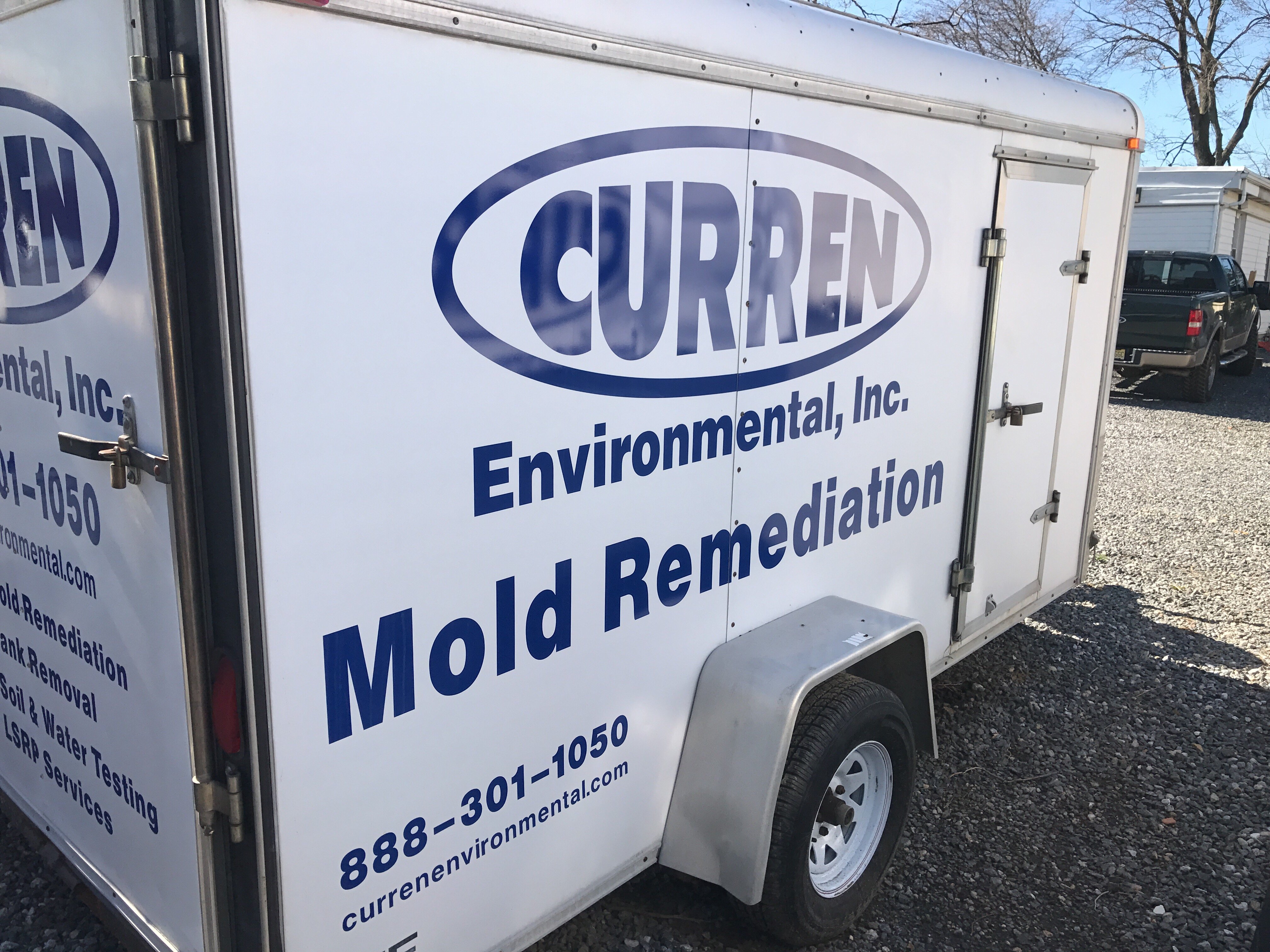

Curren Environmental is a leading mold inspection, mold testing, and mold remediation company serving New Jersey, and Pennsylvania.
We have over 20 years of experience, and you can be assured that all work is performed by company personnel. We strive for smooth project execution; our office is staffed Monday through Friday to answer your questions.
Areas we serve in NJ include Northern and Southern New Jersey counties such as Atlantic County, Bergen County, Burlington County, Camden County, Cape May County, Cumberland County, Essex County, Gloucester County, Hudson County, Hunterdon County, Mercer County, Middlesex County, Monmouth County, Morris County, Ocean County, Passaic County, Salem County, Somerset County, Sussex County, Warren County, and Union County.
Our mold inspection company also serves residential, commercial and industrial property owners in New Jersey, Philadelphia, Pennsylvania and surrounding PA
communities.





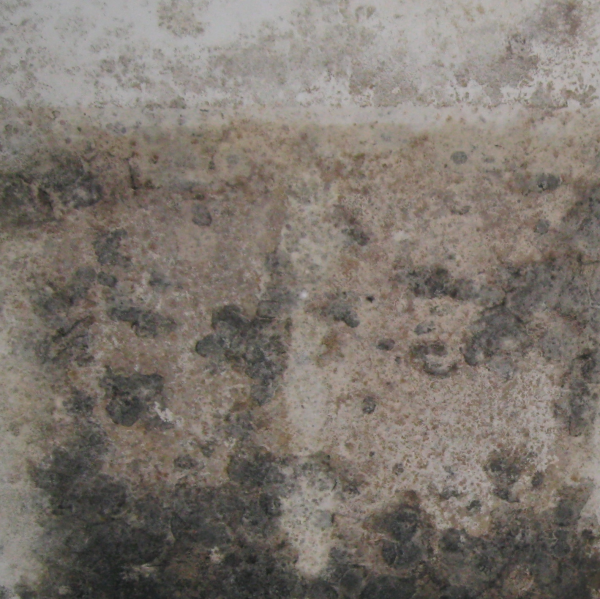-resized-600.jpg)